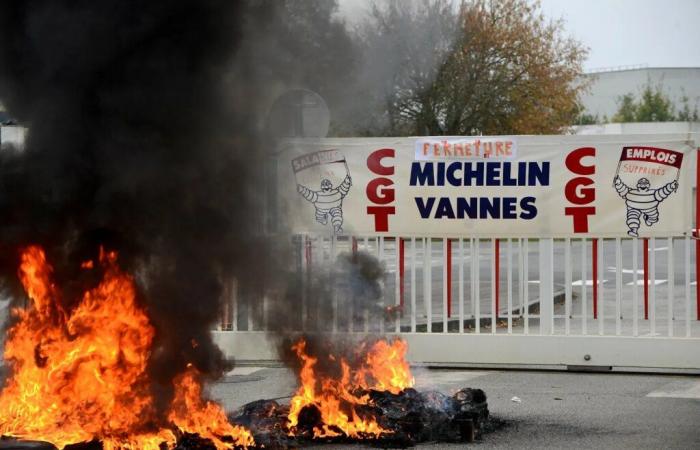Published: 1:14 p.m. – Modified: 1:19 p.m. Dolorès CHARLES
Michelin Vannes
Credit : Yann Launay
Social plans have multiplied in recent months in the great West, and it's not over. Why this accumulation? Is this the end of our competitiveness? Or, can we recover from this industrial crisis? Elements of response with Léo Charles, Lecturer at the University of Rennes 2.
Wednesday (January 22), the CGT calls for mobilization for “denounce the industrial failure”. The same day Fonderie de Bretagne should be placed in receivership, following a hearing at the Rennes commercial court.
La Fonderie in Caudan, but also Meunier in Brest and Bruz, Gautier in Vendée, Systovi in Carquefou, Saupiquet in Quimper, Yves Rocher in La Gacilly: social plans, site closures and threats of closures have multiplied in recent months, in the West as everywhere in France… and they do not only concern the automobile sector.
Relocation for better profits
Why this wave of layoffs now, when we were talking about the reindustrialization of France, with the means committed in recent years to achieve this? Was it an illusion? For the economist Léo Charles, despite the proactive speeches of politicians, liberal logic is remembered fondly.
These are “factory closures of large industrial groups, groups which are globalized and despite the massive support in particular from the French State and the subsidies they receive, still have this imperative to be competitive internationally, to be profitable, particularly for shareholders. And these groups consider the French context not favorable enough for an increase in profits. So they relocate, and look for lower wages elsewhere, or perhaps slightly lower standards… to safeguard profits.”
Credit : Yann Launay
To explain the calendar and this multiplication of social plans over the past year, it is also necessary, for Léo Charles, to take Covid into account. “This is one of the criticisms that we can make, in particular of the massive public subsidies which were given to businesses during the Covid period.
Is covid-19 to blame?
In reality, we kept alive a whole bunch of companies which, basically, had problems well before and Covid had the effect of keeping alive a whole bunch of companies, which ultimately did not have strong enough backs, from a production point of view. Today, a certain number of public debts are coming to an end, and these companies are once again facing the problems they had before, that is to say problems of production and placement on the market, etc.”
-
Brittany Foundry
Credit : Yann Launay
Should we understand that in a globalized economy, France will definitely no longer be competitive enough in the industrial sector, with labor costs among the highest in the world? “The level of salary or the cost of labor in France may seem high compared to other countries, but it is not one of the first criteria put forward when doing studies with large international groups. We also show that ultimately, these high salaries and our level of social protection allow us to have productive workers, who work well, and who are well trained.”
These firms, even if they are French, have a global strategy
For the Breton academic, public authorities still have cards to play to redress the situation. “Subsidies and aid to private companies are estimated at around 200 billion euros per year. There is political work to be done: couldn't we redirect this sum to really reindustrialize? Most of the aid is captured by large groups because we still have this ideology of the French economy, which will be pulled upwards thanks to its major flagships. However, we see that these firms, even if they are French in reality, have a global strategy. They are in no way patriotic…”
It would be necessary “rethink and plan our industrial policy, perhaps focusing on companies anchored in the territory and which do not have the will or the possibility to relocate.”
Mobilizations are planned for this Wednesday (January 22) in the West, to refuse social plans in the industry.
A white march is planned in Cholet, at the initiative of the Michelin inter-union.
The employees of the Fonderie de Bretagne should go to Rennes, at the time of the hearing at the commercial court, before a new day of mobilization on Saturday (January 25) near Lorient.






